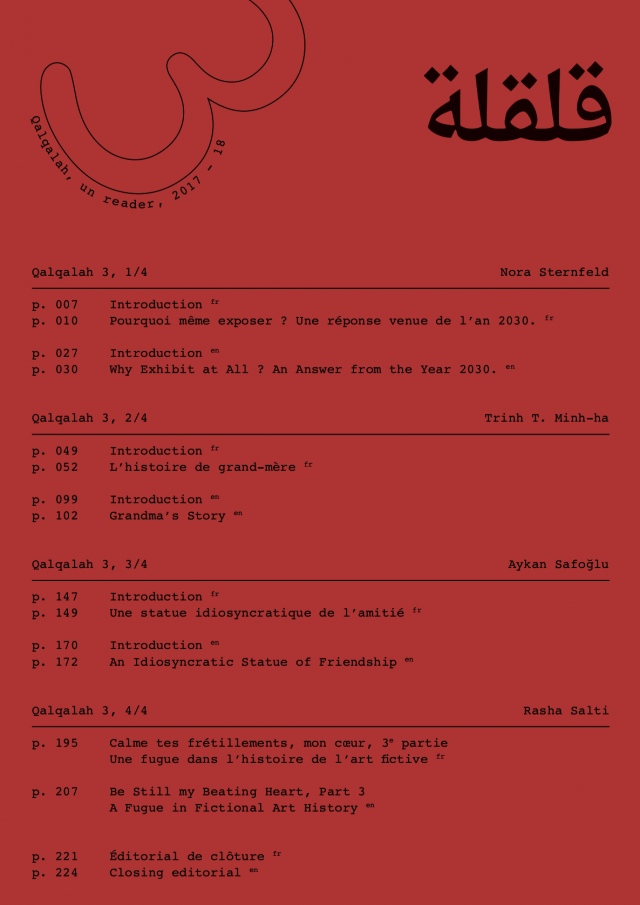Qalqalah, a Reader
In 2015, Bétonsalon – Centre for Art and Research, and the Kadist Art Foundation Paris, are launching the joint publication [Qalqalah, a “reader” gathering contributions from artists and researchers on a variety of interlinked issues. The name Qalqalah is taken from a text by Cairo-based curator Sarah Rifky. In the text, the eponymous heroine, living in the near future, gradually loses her memory in a world where notions of language, art and economy have quietly collapsed. In this world of reconstituted, fluid knowledge, which inspires a mixture of hope and fear, the meaning of the Arabic name Qalqalah—“a movement of language, a phonetic vibration, a rebound or echo”—suggests one way of moving forward.
Conceived as an online, bilingual (French/English) publication, Qalqalah provides an outlet for international voices that are not always heard in France, and vice versa. Rather than follow a purely event-based logic, Qalqalah develops over time to form a space for interactions, overlaps, digressions and interpretations, for the deepening of lines of research, the sharing of resources, and the development of critical thought decentered from Western points of reference.
Edited by: Virginie Bobin, Mélanie Bouteloup, Victorine Grataloup, Elodie Royer and Emilie Villez.
Graphic design: Syndicat (Qalqalah 1 and 2) / Guillaume Ettlinger & Jérôme Valton (Qalqalah 4).
Qalqalah is supported by the UDPN program - Usages des patrimoines numérisés (Idex SPC).
In 2020, after two years of research, workshops and events, is born the plateform Qalqalah قلقلة.
Qalqalah قلقلة is an editorial and curatorial platform dedicated to the production, translation and circulation of artistic, theoretical and literary research in three languages: French, Arabic and English. Founded in 2018 in France, in the midst of a political and intellectual context, and a media coverage marked by reactionary, authoritarian and discriminatory speeches and acts, Qalqalah قلقلة asserts a feminist, inclusive and intersectional stance.
Originating from multiple conversations with researchers, artists, artworks, texts, institutions or schools, Qalqalah قلقلة welcomes contributors who are committed to the articulation of artistic, political and social issues. More than a publishing space, Qalqalah قلقلة is conceived as a place of attachments, where one can cultivate long-lasting friendships, generative connections and multiple affections. Mothers, sisters, accomplices and lovers all have their place in it, just as much as philosophers, art laborers and Sci-Fi heroines.
Editorial Committee
Line Ajan, Virginie Bobin, Montasser Drissi, Vir Andres Hera and Victorine Grataloup
Board
Nataša Petrešin-Bachelez, Lotte Arndt and Léna Monnier
Graphic design
Montasser Drissi
Web development
Sylvain Julé
Link to the platform Qalqalah قلقلة
The first issue released in April 2015, gathers contributions from Marie-laure Allain Bonilla, Lotte Arndt, Em’kal Eyongakpa, Maryam Jafri, Saadat Hasan Manto, Pedro Neves Marques, Marian Nur Goni and Erika Nimis, Helihanta Rajaonarison, Sarah Rifky and Emma Wolukau-Wanambwa.
Download Qalqalah 1 by clicking on the image below:

The second issue released in February 2016, gathers contributions of Antariksa, Biljana Ciric, Maxime Guitton, Marianna Hovhannisyan, Otobong Nkanga, Victoria Noorthoorn, Sarah Rifky and Simon Soon.
Download Qalqalah 2 by clicking on the image below:

For this third issue, we had the great pleasure to work with Lotte Arndt as a guest editor. Thanks to her, new stories were woven through the voices of Nora Sternfeld, Trinh T. Minh-ha [thanks to a partnership with Françoise Vergès and the Global South(s) Chair at Fondation Maison des Sciences de l’Homme], Aykan Safoğlu and Rasha Salti.

Share